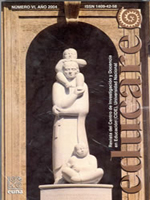Reflexiones en torno a la didáctica: implicaciones en la formación docente
DOI:
https://doi.org/10.15359/ree.2004-6.4Abstract
This paper derives from reading about and analyzing how didactics is conceptualized, as well as the its implications in teacher training. It presents background information for the area of didactics and current issues on the problems of the area. In addition, we include some didactic assumptions that are necessary to take into account in teacher training.
References
Álvarez, R. (1997). Hacia un currículo inte gral y contextualizado.
Honduras: Editorial Universitaria.
Ayuste, A., Flecha, R., López Palma, F., Lleras, J. (1998). Planteamientos de la pedagogía crítica. Comunicar y transformar. Barcelona: Editorial Grao.
Bolaños, R. y Zúñiga, l. (1998). Maestría en Formación docente con
mención en didáctica. Propuesta Universidad Nacional. Centro de Investigación y Docencia en Educación. División de Educación Básica. Documento impreso.
Comenius, J.A. (1994). Didáctica Magna. México: Editorial Porrúa.
Contreras, D. (1999). La autonomía del profesorado: Madrid Morata.
Díaz Barriga, A. (1997). Didáctica y currículum. Editorial Piado, Ibérica.
Dfaz Barriga, A. (s.f.) La investigación en el campo de la didáctica: modelos históricos. Documento en línea.
División de Educación Básica. (2000). Plan de estudios en Pedagogía con énfasis en I y II ciclos de la Educación General Básica. Heredia. Universidad Nacional. Centro de Investigación y Docencia en Educación (CIDE).
Elliot, L. ( 1996). El cambio educativo desde la investigación acción. Madrid: Editorial Morata.
Freire, P. (1997). Pedagogía de la auto,,omía. México D.F.: Siglo XXI Editores.
Kuhn, T.S. (1987). La estrucrura de las revoluciones científicas. México
D.F.: Fondo de Cultura Económica.
Martín Molero, F. (1999). La didáctica ante el tercer milenio. Madrid:
Editorial Síntesis.
Sáenz, O., Blázquez, F., Femández, P., López, M., Lorenzo, M. y Molina,
S. (1997). Didáctica general. Madrid: Amaya.
Sarramona, J. y Salomó, M. (1985) "La pedagogía hoy" En: ¿Qué es la
Pedagogía? Una respuesta actual. Barcelona: CEAC.
Published
How to Cite
Issue
Section
License
1. In case the submitted paper is accepted for publication, the author(s) FREELY, COSTLESS, EXCLUSIVELY AND FOR AN INDEFINITE TERM transfer copyrights and patrimonial rights to Universidad Nacional (UNA, Costa Rica). For more details check the Originality Statement and Copyright Transfer Agreement
2. REUTILIZATION RIGHTS: UNA authorizes authors to use, for any purpose (among them selfarchiving or autoarchiving) and to publish in the Internet in any electronic site, the paper´'s final version, both approved and published (post print), as long as it is done with a non commercial purpose, does not generate derivates without previous consentment and recognizes both publisher's name and authorship.
3. The submission and possible publication of the paper in the Educare Electronic Journal is ruled by the Journal’s editorial policies, the institutional rules of Universidad Nacional and the laws of the Republic of Costa Rica. Additionally, any possible difference of opinion or future dispute shall be settled in accordance with the mechanisms of Alternative Dispute Resolution and the Costa Rican Jurisdiction.
4. In all cases, it is understood that the opinions issued are those of the authors and do not necessarily reflect the position and opinion of Educare, CIDE or Universidad Nacional, Costa Rica. It is also understood that, in the exercise of academic freedom, the authors have carried out a rogorous scientific-academic process of research, reflection and argumentation thar lays within the thematic scope of interest of the Journal.
5. The papers published by Educare Electronic Journal use a Creative Commons License:














 The articles published by Educare Electronic Journal can be shared with a Creative Commons License:
The articles published by Educare Electronic Journal can be shared with a Creative Commons License: 



